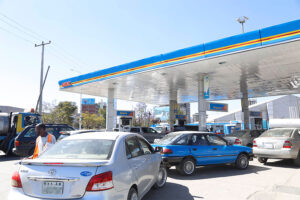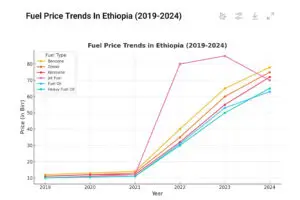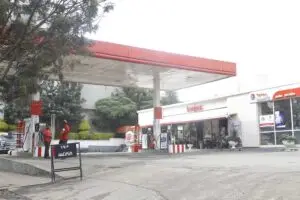Compliance Issues in the Ethiopian Gas Station Industry
The Ethiopian gas station industry plays a critical role in powering the nation’s economy. However, compliance issues within the sector continue to challenge its growth, efficiency, and reliability. From regulatory inconsistencies to environmental lapses, these compliance gaps create operational hurdles, expose businesses to penalties, and erode public trust.
In this blog post, we’ll explore the most pressing compliance issues affecting Ethiopian gas stations, their impact on the industry, and the steps needed to foster a more regulated and efficient fuel market.
1. Environmental Non-Compliance
Environmental regulations for gas stations are critical to mitigating pollution risks and protecting public health. Unfortunately, many stations fail to meet these standards due to negligence or inadequate enforcement mechanisms.
Key Issues:
- Improper fuel storage: Outdated or poorly maintained underground storage tanks lead to fuel leaks, contaminating soil and groundwater.
- Waste management: Spillage during fuel transfers and lack of proper disposal methods for waste oil contribute to environmental pollution.
- Emissions control: Many gas stations lack vapor recovery systems to reduce harmful emissions during fueling.
Impact:
Environmental non-compliance leads to long-term damage to ecosystems, regulatory fines, and increased scrutiny from environmental watchdogs. Moreover, it jeopardizes the health of communities living near gas stations.
2. Licensing and Permits
Operating a gas station in Ethiopia requires adherence to a strict licensing process. However, irregularities in obtaining and renewing licenses remain a significant compliance issue.
Key Issues:
- Unlicensed operators: Some stations operate without proper permits due to bureaucratic delays or corruption.
- Permit expirations: Lack of a streamlined renewal process causes many stations to operate on expired licenses.
- Zoning violations: Gas stations are often established in unauthorized locations, such as residential areas, violating zoning laws.
Impact:
Non-compliance with licensing and permit regulations exposes gas station owners to legal action, closure, and reputational damage. It also undermines efforts to create a safe and well-regulated industry.
3. Tax Evasion and Financial Irregularities
Tax compliance is a critical aspect of operating within Ethiopia’s gas station industry. However, tax evasion and financial mismanagement are widespread, depriving the government of much-needed revenue.
Key Issues:
- Underreporting sales: Some gas station operators falsify sales records to evade taxes.
- Illegal pricing practices: Selling fuel at inflated or unregulated prices violates tax and pricing laws.
- Cash-only transactions: A lack of digital payment systems makes it easier for stations to conceal financial transactions.
Impact:
Tax evasion not only leads to financial penalties and legal repercussions but also hampers government efforts to invest in infrastructure and fuel subsidies.
4. Fuel Quality Standards
Ensuring fuel quality is a fundamental compliance requirement, but Ethiopia’s gas stations often struggle to meet these standards due to inadequate enforcement and oversight.
Key Issues:
- Adulterated fuel: Some operators mix fuels with cheaper substances like kerosene to maximize profits, compromising quality.
- Inadequate testing: A lack of regular inspections and quality checks allows substandard fuel to reach consumers.
- Faulty equipment: Poorly calibrated pumps lead to inaccurate fuel measurements, cheating customers.
Impact:
Non-compliance with fuel quality standards damages vehicle engines, erodes consumer trust, and tarnishes the reputation of the entire industry.
5. Workplace Safety Regulations
Gas stations are inherently hazardous environments, requiring strict adherence to workplace safety standards. However, many stations fail to comply with these regulations, endangering employees and customers.
Key Issues:
- Lack of safety training: Employees often lack proper training on handling fuel, firefighting, and emergency response.
- Insufficient safety equipment: Many stations do not have adequate fire extinguishers, spill containment systems, or protective gear.
- Poor maintenance: Faulty pumps, leaking tanks, and inadequate signage increase the risk of accidents.
Impact:
Non-compliance with safety regulations leads to workplace accidents, legal liabilities, and higher insurance premiums for station owners.
6. Pricing and Subsidy Compliance
The Ethiopian government regulates fuel prices and provides subsidies to make fuel affordable for consumers. However, compliance with these policies is often lacking.
Key Issues:
- Overcharging: Some stations ignore government-mandated price caps, exploiting shortages to charge higher prices.
- Subsidy mismanagement: Fuel meant for domestic consumption is sometimes diverted to the black market or neighboring countries.
- Hoarding: Station operators hoard fuel during shortages to sell at inflated prices later.
Impact:
Pricing non-compliance exacerbates fuel shortages, frustrates consumers, and undermines government efforts to stabilize the market.
7. Corruption and Governance Issues
Corruption within regulatory bodies and the industry itself is a significant barrier to compliance in Ethiopia’s gas station sector.
Key Issues:
- Bribery for permits: Some operators bypass regulations by bribing officials for licenses and permits.
- Regulatory capture: Powerful stakeholders influence regulatory decisions to serve their interests at the expense of fair competition.
- Lack of accountability: Weak enforcement mechanisms allow non-compliant stations to operate with impunity.
Impact:
Corruption undermines the credibility of regulatory institutions, distorts the market, and discourages legitimate investment in the sector.
Solutions to Address Compliance Issues
To build a more transparent and compliant gas station industry in Ethiopia, the following steps are essential:
1. Strengthen Regulatory Frameworks
- Update and enforce stricter environmental, safety, and quality standards.
- Establish independent regulatory bodies to oversee licensing, pricing, and fuel quality.
2. Digitize Operations
- Mandate digital payment systems to improve transaction transparency and reduce tax evasion.
- Implement technology for real-time monitoring of fuel quality, storage conditions, and sales data.
3. Enhance Enforcement Mechanisms
- Conduct regular inspections and audits of gas stations to ensure compliance.
- Impose significant penalties for violations, such as revoking licenses or imposing heavy fines.
4. Increase Transparency
- Publish fuel prices, subsidy allocations, and licensing data to foster accountability.
- Create whistleblower channels to report corruption and non-compliance.
5. Invest in Training and Awareness
- Provide regular training programs for gas station employees on safety, compliance, and customer service.
- Raise public awareness about fuel quality, pricing policies, and reporting mechanisms for non-compliance.
6. Promote Sustainability
- Encourage the adoption of renewable energy technologies, such as solar-powered stations, to align with environmental standards.
- Incentivize investments in green infrastructure through tax breaks or subsidies.
The Road to Compliance
Addressing compliance issues in Ethiopia’s gas station industry requires a collaborative effort between government regulators, private operators, and consumers. By creating a robust regulatory framework, fostering transparency, and investing in modern infrastructure and training, Ethiopia can transform its fuel market into a model of efficiency, safety, and sustainability.
Compliance isn’t just a regulatory obligation—it’s the foundation for a thriving and trusted gas station industry that powers Ethiopia’s growth.
Do you operate a gas station? You can use Gas Pro, the first gas station management software in Ethiopia, to get these benefits:
Automated Tank Monitoring
Using Gas Pro, you can automatically measure your tank at the press of a button. This saves you time while increasing your measurement accuracy
Real-Time Fuel Level Alerts
Gas Pro will give “low fuel alerts” when the fuel reaches critical level and “fuel tank full” alerts when they fill up. This enables gas station owners and managers to coordinate supply of fuel.
Theft and Loss Prevention
Gas Pro’s dual-level sensors detect theft or tampering, reducing financial losses. Accurate records of fuel deliveries prevent disputes with suppliers.
Remote Pricing Control
Gas Pro enables you to remotely adjust the prices on your gas pumps thus increasing your ability to react to price changes made by the government.
More Stories

Operational Inefficiencies in the Ethiopian Gas Station Industry
Manual dipstick measurements and inventory tracking are labor-intensive, error-prone, and time-consuming. These methods often result in inventory discrepancies, which can lead to financial losses and operational disruptions.

Keeping the Pumps Running: Tackling Supply Chain Challenges in Ethiopia’s Fuel Market
Fuel is the lifeblood of any economy, powering everything from transportation and agriculture to industrial production. In Ethiopia, a nation undergoing rapid growth and development, the demand for fuel is rising steadily. Yet, ensuring a consistent and affordable fuel supply remains a formidable challenge.

From Addis to Rural Ethiopia: Bridging the Fuel Access Gap
Bridging the fuel access gap between Addis Ababa and rural Ethiopia will require concerted efforts from all stakeholders, from government officials to private investors. With the right policies, infrastructure investment, and technological innovation, Ethiopia can ensure that all its citizens—regardless of where they live—have equal access to the fuel they

The Future of Fuel: Opportunities and Growth in Ethiopia’s Gas Station Market
Ethiopia’s gas station market is at the cusp of transformation, and for those looking to invest, the future offers plenty of opportunities to drive growth and innovation. Whether you’re an entrepreneur looking to build your brand or an investor seeking profitable ventures, this is a sector worth watching.

Rising Prices, Rising Challenges: Navigating Fuel Costs in Ethiopian Gas Stations
Fuel prices are a central concern for gas station owners, operators, and consumers across Ethiopia. As a country that imports the majority of its petroleum products, Ethiopia is highly sensitive to global oil price fluctuations, foreign exchange availability, and government-imposed pricing regulations.

Fueling Ethiopia: How Government Policies Shape the Gas Station Industry
The gas station business in Ethiopia plays a pivotal role in keeping the country’s economy moving. From fueling vehicles to powering machinery, the availability and pricing of fuel impact everything from transportation costs to consumer goods.
